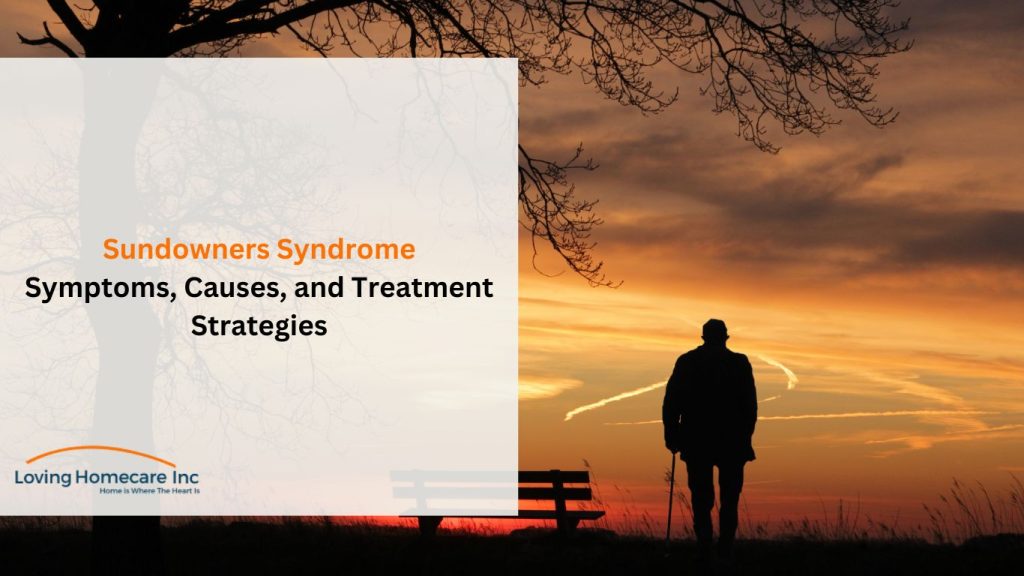Recently updated on January 8th, 2026 at 10:37 am
Sundowners Syndrome, often called Sundowning, is a complicated and poorly understood disorder that frequently goes hand-in-hand with Alzheimer’s disease and dementia. Around 20% of people according to Cleveland clinic, diagnosed with Alzheimer’s disease experience sundowning at some point. When this condition sets in, a person’s normally placid disposition in the morning suddenly becomes more agitated and confused in the late afternoon and evening. In order to deliver the best specialized care possible to people with dementia, it is essential for healthcare providers, family members, and caregivers to understand Sundowners Syndrome.
What Is Sundowners Syndrome?

Sundowning is a condition characterized by cognitive disorientation that often arises in the late afternoon and persists into the night. Sundowning may manifest in a range of behaviors, including but not limited to bewilderment, anxiety, anger, and disregard for instructions. It is most common in older people/ geriatrics and personal care for seniors is mostly recommended.
Individuals may exhibit sundowning, which refers to a state of restlessness, agitation, irritation, or disorientation that often occurs or intensifies as daylight diminishes. This phenomenon frequently coincides with the time when exhausted caretakers want respite. Sundowning may persist throughout the night, causing difficulty for those with Alzheimer’s disease in both initiating sleep and remaining in bed.
What is Sundowning in Dementia?
Dementia patients often exhibit a constellation of problematic behaviors known as “sundowning” that intensify as the sun sets. Sundowning may occur at any phase of dementia, but it is more prevalent during the intermediate and advanced phases. Dementia symptoms such as agitation, disorientation, and anxiety tend to peak around sunset, which may be challenging for caregivers and those living with the disease. It is thought that variables such as interruptions to the sleep cycle, exhaustion, and unfulfilled needs contribute, however the precise explanation is yet unknown. Fortunately, keeping a regular schedule, creating a soothing atmosphere, and attending to basic requirements may help people manage sundowning and enhance their quality of life.
Significance of Sundowners Syndrome
Sundowners syndrome, characterized by heightened agitation and disorientation in the late afternoon or evening, is a major concern for dementia patients since it exacerbates their symptoms and puts care givers under stress. Additionally, it may signal the onset of more serious dementia symptoms or other health problems, therefore it’s crucial to see a doctor to address both the symptoms and their sources.
What is Sundowning: Symptoms and Triggers

Symptoms of Sundowners Syndrome vary but often include:
- Increased confusion and disorientation
- Agitation and irritability
- Restlessness and pacing
- Mood swings and sudden emotional outbursts
- Hallucinations and delusions
Common Triggers
- Fatigue and exhaustion as the day progresses
- Low lighting and shadows causing misinterpretation of surroundings
- Disruption in the internal body clock or circadian rhythm
- Unfamiliar environments or changes in routine
What are the Causes of Sundowning
Although the exact origins of sundowning remain a mystery, a collection of factors may increase the likelihood that it will occur. Some of these are:
- Exhaustion, appetite loss, discomfort, or other unfulfilled bodily demands
- Not getting enough sunshine throughout the day, being too stimulated during the day (e.g., from a loud or busy environment)
- Having one’s internal hormone levels disrupted, which changes throughout the day, and having some kind of sensory impairment (e.g., loss of hearing or sight)
- Causes of other people’s exhaustion, which in turn upsets the dementia patient, mental health issues including anxiety or depression,
- A lack of caregivers to assist the patient in a nursing home, and adverse medication reactions.
While some of these factors are time-dependent, others are more general. Since various issues may call for different approaches to therapy, it’s important to narrow down the list of possible issues impacting the individual.
Medications That Cause Sundowning
Anticholinergic medications
Medicines that suppress the action of the neurotransmitter acetylcholine (ach) at synapses in the central and peripheral nervous systems are known as anticholinergic medicines (or “anticholinergics”). For example,
Tricyclic antidepressants
- Amitriptyline
- Doxepin
Antihistamines:
- Diphenhydramine (Benadryl)
- Dimenhydrinate (Dramamine)
Antispasmodics:
- Oxybutynin (Ditropan)
- Hyoscyamine
Benzodiazepines
Benzodiazepines are a class of central nervous system (CNS) depressants that promote relaxation, lethargy, and sleep. In the central nervous system, they work by opening up channels for the inhibitory neurotransmitter GABA to attach to its many receptors. Examples include:
- Alprazolam (Xanax)
- Diazepam (Valium)
- Lorazepam (Ativan)
Opioids
Opioids, often known as narcotic analgesics, are a group of medications that alleviate moderate to severe pain, whether it’s acute or chronic. They go by a variety of names, including narcotics, opioid analgesics, and opiates. Something that reduces discomfort is called analgesic.
- Hydrocodone (Vicodin)
- Oxycodone (Percocet)
- Morphine
What are The Best Treatments for Sundowning
 In order to regulate the sleep-wake cycle, it is recommended to increase the amount of light that is present in the morning and reduce the amount of light that is present in the evening.
In order to regulate the sleep-wake cycle, it is recommended to increase the amount of light that is present in the morning and reduce the amount of light that is present in the evening.-
Newer melatonin supplements are considered for sleep-wake regulation in dementia care, though medication is used conservatively alongside non-pharmacological interventions to reduce restlessness and minimize risks.
-
For severe agitation, antipsychotic medications may be used, but current guidelines emphasize non-pharmacological interventions first due to risks of falls and confusion, reserving drugs for extreme cases.
- A predictable timetable and routine offer security and avoid misunderstanding with regard to the situation.
-
Acetylcholinesterase inhibitors are tailored for sleep-wake regulation and cognitive enhancement in dementia, integrated into personalized care plans that prioritize holistic approaches.
- Develop good sleeping habits by setting a calming routine for going to bed and making sure that your sleeping environment is comfortable. This will help you develop healthy sleeping patterns.
- Benzodiazepines may be effective in reducing anxiety in some circumstances; nevertheless, owing to the potential for adverse effects, it is important to exercise care while using these medications.
- There is a possibility that antidepressants, which are drugs, might be of assistance in the treatment of conditions such as anxiety or depression, both of which can make sundowning more severe.
- Take shorter naps throughout the day. Taking longer naps during the day might make it more difficult to fall asleep at night.
- When it comes to aromatherapy, some scents, like lavender, have the power to bring about emotions of calm and relaxation.
- Multisensory stimulation, in order to bring comfort and minimize agitation, it is beneficial to engage many senses (touch, smell, and hearing) along with activities that are relaxing.
- Bright light treatment, in which, first thing in the morning, one is subjected to bright light, may be able to aid in the management of the rhythm of sleep and awake.
- Going for walks on a regular basis throughout the day might boost your energy levels and help you sleep better at night.
- It is possible that the use of music that is calming may assist in the reduction of agitation and the creation of an environment that is more relaxing.
-
Today, innovative digital tools like virtual reality experiences and memory apps are increasingly used for cognitive engagement and emotional comfort, complementing traditional methods. Smart home technology, including wearables that track sleep and vital signs, helps maintain regular patterns and prevent incidents, with studies showing up to 45% reduction in fall risk through real-time monitoring.
- Make the atmosphere comfortable and familiar, limit the amount of clutter, and engage in activities that are relaxing in order to alleviate anxiety.
- Sundowning may be made worse by certain activities or circumstances, thus it is important to identify these triggers. Try to steer clear of these potential triggers.
- Caffeine, a stimulant that may prevent sleep, should be used in moderation before bedtime.
- Being physically active on a regular basis may enhance the quality of sleep and decrease stress.
- In order to facilitate relaxation, a peaceful atmosphere that is devoid of clutter and is quiet is essential.
- Reducing noise is important because loud sounds may cause disorientation and raise irritation.
Actionable Tips for Managing Sundowning Syndrome
- A calming routine consists of keeping a regular sleep pattern and taking just a few short naps throughout the day.
- The management of pain or discomfort is an essential step in maintaining comfort and treating the underlying conditions that are causing the discomfort.
- Dim lights and stay away from loud sounds in the evening to reduce the amount of stimulation you experience.
- Walks, music therapy, or aromatherapy are all activities that may be done before sleep to help you relax and unwind.
- Determine the Triggers and stay away from events or activities that accelerate the sundowning process.
-
Recent case studies, such as those from Los Angeles home care agencies, demonstrate that integrating AI-enabled fall detection and medication reminders can reduce emergency hospitalizations by 30% and significantly decrease sundowning episodes. Memory care communities using calming color schemes and multisensory routines report improved mood and family satisfaction.
- If you are having trouble falling or staying asleep, it is recommended that you see a medical expert about the use of melatonin or light therapy as sleep aids.
-
Create safe, predictable environments using smart home adaptations like AI-driven monitoring, adaptive lighting, and safety alerts, alongside familiar surroundings and clutter reduction to support routines and reduce agitation.
Living Well with Sundowning
For both the sufferer and their loved ones, sundowning may be a perplexing and difficult time. You may make your evening routine more tranquil and less affected by sundowning if you follow these guidelines and try to create a friendly atmosphere. Keep in mind, there are those who can relate. Seek the advice of a medical expert if you feel you need further assistance or have concerns about certain circumstances.
Another option is to consider home care assistance for a tailored strategy and professional direction. Skilled care givers at Loving Homecare can assess your loved one’s requirements, learn about sundowning, and develop a personalized plan to fulfil those needs. For more information about how we can assist in developing a relaxing and pleasant nighttime routine, contact us now!
FAQ's
– Daylight loss may cause confusion and disorientation.
– Daily routine changes might be unpleasant.
– Physical pain or discomfort might increase sundowning symptoms.
– Unfulfilled hunger or thirst may cause agitation.
– Overwhelming sounds or clutter may cause sensory overload.


 In order to regulate the sleep-wake cycle, it is recommended to
In order to regulate the sleep-wake cycle, it is recommended to